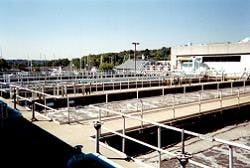The city of Glen Cove, N.Y. enters public-private partnership to help address compliance of various environmental issues
Environmental compliance is a key driver in municipalities deciding to enter public-private partnerships. The city of Glen Cove, N.Y., contracted with Severn Trent Services in 1992 as a way of limiting their liability as a result of the operation of the city's wastewater treatment facility.
Neighboring an open-air dining establishment and plagued by a history of odor complaints, this problem needed to be rectified immediately and cost effectively.
Within the first two years of the 20-year contract—the first long-term O&M contract of its kind in the U.S.—Severn Trent invested more than $3 million in capital improvements, including modern sludge handling equipment, stand-by power generators, and plant automation systems.
To address the odor complaints, a portion of this investment was used to construct a new sludge handling facility that included a dedicated building to house a new filter belt press, material handling equipment to convey the filter cake to trailers and an odor-control system.
The operation of this equipment alone significantly reduced odor generated by the sludge handling process.
Further control of odors
To further control odors, several operational and process changes were made. The first change was to modify the method of collecting and processing the plant’s sludge.
The plant was designed to mix the primary and secondary sludge in open tanks with forced air. Whenever the air was turned on, however, the odors coming off the tank would be enough to generate complaints from as far as a mile away.
Severn Trent immediately stopped this procedure and switched to co-settling. Secondary sludge is now introduced into the primary tanks and settled with the primary sludge. On a daily basis, this sludge is withdrawn from the primary tanks and processed in the new belt filter press. This keeps the sludge underwater at all times until it reaches the belt press.
To control odors in the sludge handling facility, Severn Trent chose an innovative method of mixing ferrous chloride with the sludge prior to pressing. The ferrous chloride precipitates out the hydrogen sulfide in the sludge, thereby significantly reducing odors from the pressing operation.
In addition, an odor-controlling chemical is introduced in two places: at the discharge of the press and while the material is being conveyed to the trailers.
An increase in laboratory testing because the contract was initiated has provided more complete data and increased process control, facilitating an improvement in environmental compliance. With 40% of the flow generated by local industry, including treatment of industrial waste, Severn Trent has been instrumental in implementing improvements to the city’s Industrial Pretreatment Program. With these changes, the city's operating costs were reduced by ten percent, saving $200,000 per year.
In 1999, the city elected to extend Severn Trent's contract an additional eight years.
In 2002-2003, the city of Glen Cove procured a grant from the Department of Environmental Conservation to fund a facility upgrade to meet the proposed nitrogen limits through 2014.
At that time, the State Pollutant Discharge Elimination System (SPDES) permit was modified to reduce the effluent flow to 5.5 MGD and finalize the metals discharge limits. Construction, which began in 2002 with the upgrade of the facility, has included fine air diffusers, mixers and anoxic and selector zones.
Aeration blower installation
A new aeration blower was installed with dissolved oxygen (DO) feedback loops from each of the aeration basins to optimize DO control and promote nitrification. The existing screw pumps were retrofitted with variable frequency drives and programmed to work in conjunction with the effluent flow meter to allow their utilization for nitrate return to the head of the aeration basins for denitrification. Modifications and safeguards were installed on the screw pumps after the project was completed to ensure future permit limitations will be met. Severn Trent is currently operating the BNR process and meeting the 2014 permit requirements established in the newly issued SPDES permit.
According to Nick DeSantis, director of Public Works, "Government is downsizing more and more, and I want to concentrate on the broader infrastructure responsibilities of the city and not operate a wastewater plant. It is easier to have a private partner to keep up with all the DEC requirements for operating a sewerage plant. I did believe that I could achieve operating cost reductions, but Severn Trent is doing multifaceted jobs with the workforce, which the city was not able to do."
